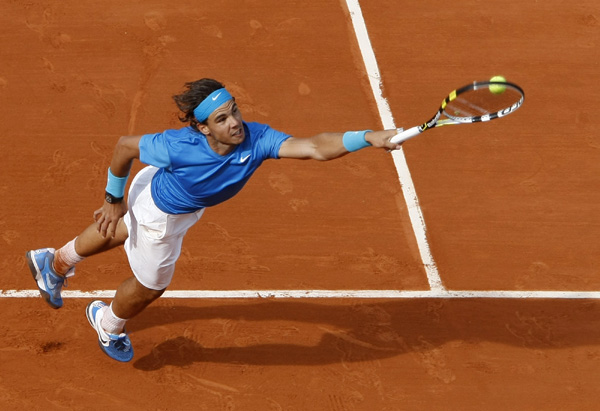
Defending champion Spain's Rafael Nadal stretches to return the ball to USA's John Isner during their first round match of the French Open tennis tournament, at the Roland Garros stadium in Paris, Tuesday, May 24, 2011. (AP Photo/Lionel Cironneau)
PARIS — It’s newsworthy enough when anyone manages to win a set against Rafael Nadal at any stage of the French Open — let alone two sets in the first round.
So a buzz built at Roland Garros on Tuesday when unseeded American John Isner pulled ahead of five-time champion Nadal by pounding serves, pushing up to the net time after time for volleys, and generally making the Spaniard uncomfortable for stretches.
“Quite clearly,” Nadal acknowledged later, “this is a match that I could have lost.”
In the end, he did not. Stretched to five sets for the first time in 40 career French Open matches, Nadal came back to emerge with a 6-4, 6-7 (2), 6-7 (2), 6-2, 6-4 victory over Isner and reach the second round.
“Really, what it came down to is the way he played in the fourth and fifth sets,” Isner said. “I haven’t seen tennis like that, ever.”
Nadal’s bid to equal Bjorn Borg’s record of six championships at the clay-court Grand Slam tournament nearly came to a too-abrupt-to-believe halt.
Consider:
— Nadal entered the day 38-1 at the French Open, his only loss coming to two-time finalist Robin Soderling in the fourth round in 2009.
— Isner’s career in Paris before Tuesday? One first-round exit and one trip to the third round, for a 2-2 record.
— Nadal is ranked No. 1 and owns nine Grand Slam titles.
— Isner is ranked 39th and never has been past the fourth at a major tournament. He’s best known to date for winning the longest match in tennis history, 70-68 in the fifth set at Wimbledon last year, and setting a record with 113 aces in that marathon.
— Until the first of Tuesday’s two tiebreakers, Nadal hadn’t lost a single set at the French Open since 2009. And he hadn’t lost a set in any of 12 previous first- or second-round matches in the tournament.
So all seemed rather ho-hum when Nadal was leading Isner by a set and a break at 4-2 in the second. But Isner broke back to 4-all when Nadal missed a forehand, and suddenly, a tight match ensued.
“That’s when I started to sort of believe a little bit more,” Isner said, “and started to play with more confidence and strut around more out there.”
Even Nadal was a bit worried. So was Toni Nadal, Rafael’s coach and uncle, who would later say that from his perch in the stands he felt “very, very nervous, because losing in the first round is not too good for us.”
But his nephew steeled himself, and made zero — yes, that’s right, zero — unforced errors in the fourth set, while Isner made 12. Nadal broke Isner for a 2-1 edge in the fourth set, and called that “the turning point.”
Isner’s coach, Craig Boynton, agreed.
“Rafa getting up an early break in the fourth really helped his psyche,” Boynton said.
Nadal broke for a 2-1 lead in the fifth set, too, thanks in part to a cross-court backhand return winner, a forehand return winner, and a backhand return at the feet of the net-charging Isner. Uncle Toni greeted each with a yell of “Vamos!”
“Fantastic game for me,” Nadal said. “I played my best game of the match.”
There was still work to be done, and to Isner’s credit, he made Nadal earn it right to the end.
Isner saved one match point while down 5-3. In the next game, four hours into the match, and with Nadal serving at 5-4, they played a 25-stroke point at 30-all. It was a classic clay-court point, carried out from the baseline, and Isner hung right in there until Nadal whipped a forehand winner.
Isner paused beside the green courtside advertising signs, leaned over and put his hands on his knees.
“That’s one of the reasons why he does what he does,” Isner said. “I mean, he just outlasted me there.”
One point later, the match was over.
“You need to see the positive side of things. I was stressed, but I managed to overcome my stress,” Nadal said through a translator. “The negative is that I was in control of the match, and then I lost control, and I spent two hours more than what I should have.”
Boynton also made sure Isner would try to view what happened Tuesday in a positive way.
“It’s A-plus from Johnny’s side, I think. I couldn’t be any more proud of him,” the coach said. “My message to John was, ‘You got beat by the best clay-court player of all time; you didn’t lose.'”

